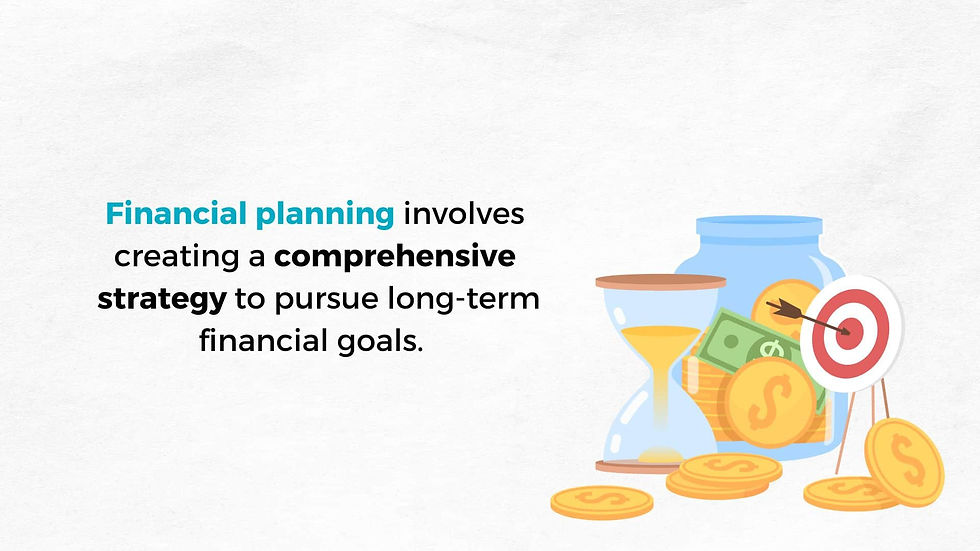At What Net Worth Should I Get a Financial Advisor?
- Troné Fossum
- Oct 28, 2024
- 8 min read
Updated: Jan 19

At what net worth should I get a financial advisor?
Q: At what net worth should I get a financial advisor?
A: The simple answer to that question is that as soon as you feel uncomfortable managing your investments alone, you should seek the guidance of a financial advisor.
However, in general, it's wise to start working with a financial advisor or wealth management team once you've built a nest egg of $1M in investable assets. However, you may wish to seek guidance earlier.
Keep in mind that the greater your assets, the more complex your financial situation becomes.
If you're a high-income earner with a busy life, you probably don't have time to manage a complex investment portfolio or ensure you're not exposed to excess risk.
In addition, with higher income comes higher taxes. Working with a financial advisor who can also help you with tax planning may result in tax savings opportunities.
It's wise to ensure that you have an investment strategy and customized financial plan that's aligned with your values, goals, and risk tolerance. If you're already extremely busy with your professional and personal life, making big financial decisions alone can be risky.
Table of Contents
How Much Money Should You Have Before Hiring a Financial Advisor?
If you have $1M or more in investable assets, it's likely time to seek the advice of a wealth management team who can provide comprehensive advice.
But what's the minimum amount a person should have before seeking the guidance of a financial advisor?
First, it's important to note that many advisory firms have account minimums. This means they cannot take you on as a client if you have less than their account minimum. Minimums vary across the industry, ranging from $100,000 on the low end to $2M or more on the high end.
Many people seek the guidance of a financial advisor before hitting the $1M mark. For example, if you have $250,000 or more in investable assets and feel behind on your financial planning and tax planning, it may be wise to seek professional guidance.
When to Start Working with a Wealth Management Team
Once you have $1M or more in investable assets, the benefits of working with a wealth management team are often well worth the cost.
A wealth management team will help you with tax planning, investment management, estate planning, and retirement planning. They'll create a customized financial plan and wealth strategy aligned with your goals and values.
Financial advisors can help you prepare for milestones like retirement or your child’s education.
Thus, it's not just about the amount you have but also the complexity of your financial situation. The greater the complexity, the more critical it is to seek professional guidance so you don't end up making costly mistakes.

Why We Recommend Working with a Fiduciary Advisor
If you're on the hunt for the right financial advisor, we recommend that you seek out a fiduciary.
A fiduciary financial advisor is legally obligated to act in your best interest.
This means they must prioritize your financial well-being over their own profits, providing advice that is tailored to your needs rather than their bottom line.
Unlike non-fiduciary advisors, who might earn commissions from selling specific products, fiduciaries are transparent about fees and avoid conflicts of interest. Non-fiduciary advisors are only required to provide "suitable advice." However, a fiduciary advisor must provide the best possible advice. In other words, they must meet a higher standard of service and care.
Working with a fiduciary financial advisor ensures that your financial strategy is tailored to your goals, not influenced by hidden incentives.
Do I Need a Financial Advisor, or Should I Do It Alone?
DIY financial management requires a deep understanding of investments, tax laws, and market trends.
While tools and resources are available, it can be overwhelming, particularly if your financial situation is complex or you are a high-income earner.
A financial advisor offers expertise, saving you time and potentially costly mistakes. Consider your confidence level and the time you're willing to dedicate to managing your wealth. When you're beginning your wealth-building journey, it's entirely reasonable to manage your investments independently.
But as your net worth increases and your financial situation becomes more complex, seeking the guidance of a financial professional is a smart move.
Once you have investable assets of $1M or more, seeking the guidance of a wealth management team may be a wise choice. The greater the complexity of your finances, the more value you can extract from your wealth management team.

What Does a Financial Advisor Do?
A financial advisor creates strategies that seek to grow and protect your wealth, including retirement planning, tax optimization, and investment management.
They act like a GPS for your finances, helping you navigate market fluctuations and life changes. For example, they can assist in diversifying your investments to minimize risk or in structuring your business finances to maximize tax efficiency.
There is no guarantee that a diversified portfolio will enhance overall returns or outperform a non-diversified portfolio. Diversification does not protect against market risk.
Advisors can help reduce emotional decision-making, potentially leading to better long-term financial outcomes. A good financial advisor is not just a planner; they are partners in your financial journey.

When to Hire a Financial Advisor
Significant life events often signal that it’s time to consider hiring a financial advisor.
Examples of critical milestones include getting married, having a child, selling a business, and approaching retirement. These milestones can significantly impact your financial situation and require careful planning.
If you're receiving a large inheritance or experiencing a sudden increase in income, an advisor can help you manage these assets wisely.
A survey by Northwestern Mutual found that "nearly 7 in 10 (67%) Americans who use a financial advisor believe they have clarity on how much to spend now and save for later compared to less than half (44%) of those without an advisor." An advisor can help ensure that you’re making decisions that align with your long-term goals.
In addition, once you have $1M or more in investable assets, it may be wise to seek the guidance of a wealth management team that can help you with tax, investment, estate, and retirement planning.
How Much Do Financial Advisors Cost?
Financial advisors typically charge based on a percentage of assets under management (AUM) or a flat fee.
The average AUM percentage is 1% annually, but this can vary depending on the size of your portfolio and the advisor's services. Typically, the more assets that your advisory firm manages on your behalf, the lower the AUM percentage.
When evaluating costs, it's important to consider the benefits of working with an advisor. Consider the services your wealth management firm will provide and decide if they are worth the cost.

How to Pick a Financial Advisor
Choosing a financial advisor requires careful consideration of their qualifications and approach.
Look for credentials like Certified Financial Planner (CFP) or Chartered Financial Analyst (CFA), which indicate a high level of expertise. Ask about their fee structure, investment philosophy, and how they tailor their services to individual needs.
It’s also wise to check their background on regulatory websites like FINRA’s BrokerCheck. Speak with a few different advisors to find one who aligns with your values and goals.
Most importantly, make sure you feel comfortable speaking to your advisor about your financial situation as well as your goals, dreams, and values.
Common Questions
What is financial planning?
Financial planning involves creating a comprehensive strategy to pursue long-term financial goals.
This includes budgeting, saving, investing, retirement planning, and managing risks. A financial plan outlines steps to grow and preserve wealth, working towards financial stability and security.
What is a financial plan?
A financial plan is a detailed document outlining strategies for pursuing financial goals.
It covers aspects like budgeting, saving, investing, retirement planning, and risk management. A well-crafted plan helps you stay on track toward long-term objectives, adjusting as life changes.
What are the benefits of working with a financial advisor?
Financial advisors offer expertise in creating personalized investment, retirement, and tax planning strategies.
They help avoid emotional decision-making, provide accountability, and adapt plans as life changes. This professional guidance can improve financial outcomes and provide confidence.
At what point is it worth getting a financial advisor?
When your financial situation becomes complex—like significant income growth, nearing retirement, or managing investments over $100,000—consider an advisor.
They provide expertise for navigating intricate financial decisions, optimizing investments, and planning for the future, ensuring your strategy aligns with your long-term goals.
Does the average person need a financial advisor?
Not everyone needs a financial advisor. If your finances are straightforward, you might manage on your own with some research.
However, if your situation involves complex investments, planning for retirement, or significant life changes, professional advice can be beneficial.
How do I know if I need help managing my investments?
If you think you need help managing your investments, then you probably do.
If you feel overwhelmed by investment choices, lack time for proper research, or aren't confident in your strategy, seeking professional help is wise. An advisor offers personalized guidance, helping you avoid costly mistakes and keeping your portfolio aligned with your risk tolerance and goals.

What questions should I ask a financial advisor before hiring them?
Ask about their credentials, fee structure, investment philosophy, and how they tailor strategies to individual goals.
Inquire about their experience with clients in similar situations and how they measure success. Understanding their approach helps ensure they align with your financial objectives.
What is a certified financial planner? Do I need one?
A Certified Financial Planner (CFP) has met rigorous education, exam, and experience requirements, adhering to a strict ethical standard.
If you need comprehensive financial planning, a CFP is highly qualified to guide you through investments, retirement, taxes, and more.
What are the different types of financial advisors available?
Financial advisors include Certified Financial Planners (CFPs), wealth managers, investment advisors, and robo-advisors.
Each specializes in different areas, from comprehensive financial planning to automated investment management. Choosing the right type depends on your financial needs and goals.
What is a wealth manager?
A wealth manager offers comprehensive financial services for high-net-worth individuals, including investment management, estate planning, tax services, and retirement planning.
They focus on growing and preserving wealth, often coordinating with other professionals to provide a holistic financial strategy.
What are fee-only advisors?
Fee-only advisors are compensated solely through client fees, not commissions from financial products.
This model minimizes conflicts of interest, ensuring advice is given in the client's best interest. They typically charge a flat fee, hourly rate, or a percentage of assets under management.
What is the most common structure for advisor fees?
The most common fee structure is a percentage of assets under management (AUM), typically around 1% annually.
Some advisors offer flat fees, hourly rates, or a combination. Understanding the fee structure helps determine if the services provide value relative to the cost.
What is investment management?
Investment management is the process of building and overseeing a portfolio of investments to meet specific financial goals.
This involves selecting assets, balancing risk, and monitoring performance. The goal is to grow wealth long-term while aligning with the investor's risk tolerance.
Other Articles and Guides
About 360 Financial
360 Financial is an independent wealth management firm with a team of specialized financial advisors and financial planners. As fiduciaries, 360 Financial’s advisors provide services to business owners, entrepreneurs, and professionals. We help investors with sudden wealth, retirement planning, tax planning, estate planning, and business financial planning.
Headquartered in Minnesota, we serve investors across the US with online and in-person wealth management and financial planning services.



